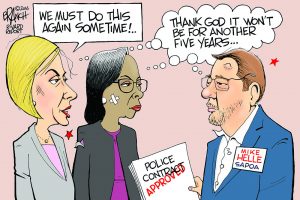The most important accomplishment for the City of San Antonio in its two-year battle to negotiate a new collective bargaining agreement with the San Antonio Police Officers Association (SAPOA) can’t be found in the contract.
History will record the new agreement coming in the first full term of Mayor Ivy Taylor three years after former Mayor Julián Castro first signaled his willingness to finally take on the police and firefighter unions on the issue of runaway healthcare costs.
But the person at City Hall leading the charge all along was City Manager Sheryl Sculley who, it turns out, literally gambled her legacy on being able to gain a satisfactory outcome. Had police union officials been successful with their million dollar smear campaign to oust Sculley, her challenge would have ended her career in San Antonio.
Ever since Mayor Henry Cisneros and a City Council in the 1980s approved the generous terms that became the foundation of the modern police and fire contracts there has been too little give and take in the collective bargaining process. For nearly three decades no mayor or City manager was willing to spend the political capital and risk a confrontation with the unions.
Sculley ended that long and expensive period of elected officials sidestepping their responsibility. That’s why the most important element is not found in the contract. Sculley has set a new precedent for future City managers and mayors to uphold: Negotiate every five years. Be fair, but be tough. No more passing the buck.
Rivard Report cartoonist John Branch got it right when he showed Sculley thinking, “Let’s do this again in five years.” She almost certainly will not be in her current position in 2021, but her successor should come into the job knowing that part of his or her job is to represent the City’s fiscal and public safety best interests every five years.
City Councilmen Rey Saldaña and Ron Nirenberg cast lone votes against the new contract last week, and while their opposition did not attract allies, it did serve to highlight what local members of the #BlackLivesMatter movement have been saying all along: the contract inhibits police leaders from imposing disciplinary actions on officers and making the punishment stick.
So two likely future mayoral candidates gave themselves a principle and an issue to stand on, and officeholders who approved the contract and those who succeed them will know that work remains to be done.
I’ve had a number of people ask me this: Who won? It’s a fair question. When Mayor Taylor facilitated the negotiations going into private mediation, it included a willingness to give the union more than Sculley and her negotiating team wanted to give. In that sense you can argue that the City manager didn’t get what she wanted.
Mayor Taylor knew what many who have engaged in the collective bargaining process know: no one should get everything they want, and a good outcome often leaves everyone feeling unhappy and hungover.
Yet Sculley won a lot. The contract is projected to save taxpayers $85 million in healthcare costs over the next five years, and that savings was at the heart of Sculley’s strategy from the beginning. She also was able to secure a new evergreen clause that, while still far too long at eight years, is now considerably weakened by the 10% healthcare escalator.
Mike Helle, president of the police union, can face his members and honestly say he won a better wage deal than anyone imagined possible. He also should face them and admit all efforts by the union and its allies to oust Sculley failed as did union efforts to unseat some Council members.
Taxpayers want police and firefighters to protect people and property. They don’t want them running the city.
In the court of public opinion, there is no doubt in my mind that the union campaign to vilify Sculley backfired, and while a fair number of people have branded the City manager as a control freak and dictatorial, far more people admire her for finally taking on the union, and perhaps, even more for not caving once along the way.
Eleventh-hour calls to reopen negotiations failed, but it’s evident that officeholders and the public want reforms. If we can’t have them now, we will keep pressing until we get them. We aren’t the only city in the nation on that path.
In the meantime, a new precedent has been set in San Antonio. Come time to talk about a new contract, we want to give police and firefighters the good deal they deserve, but they are going to have to reciprocate and demonstrate they, in turn, respect the public interest and the individuals we choose to represent us.
That’s fair play. Call it the Sculley Rule.
http://therivardreport.com/rivard-police-contract-sets-new-precedent/


